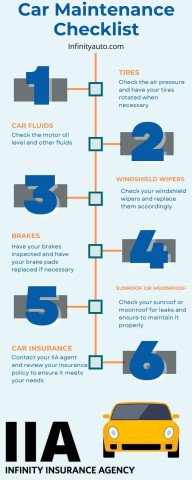Regular car maintenance can be an essential factor for the safety and longevity of your vehicle. At Infinity Insurance Agency, Inc. (IIA), we understand that a well-maintained car not only runs smoother but may also help you avoid costly repairs and dangerous situations like accidents. Routine maintenance can catch potential issues early, which can help save you from unexpected breakdowns and expensive repairs. Additionally, a well-maintained car can perform better, can get better gas mileage, and may have a longer lifespan. In this blog, we will guide you through a basic car maintenance checklist to help keep your vehicle in top shape.
Check tire pressure and rotate tires
Maintaining proper tire pressure and regular tire rotation are key aspects of vehicle upkeep. Low tire pressure can cause uneven tire wear, reduced fuel efficiency, and increased risk of a blowout. It's advisable to check your tire pressure monthly and before long trips. Refer to your vehicle’s owner manual for the recommended tire pressure. Having your tires rotated every 3,000 to 5,000 miles helps them wear evenly, which can extend their life and improving your car’s handling.
Check motor oil and other fluids
Having a professional mechanic check and maintain your car's fluids is crucial to its performance and longevity. Here is a quick guide to what your mechanic does when you take it in for service.
- Cleans dipstick: The mechanic ensures your car is turned off and parked on level ground or the car lift. He pulls out the dipstick, wipes it clean, and reinserts it.
- Checks oil level: The mechanic removes the dipstick again to check the oil level. If it’s between the FULL and ADD marks, your oil level is most likely good. If it’s below the ADD marks, then the mechanic adds more oil.
- Assess oil quality: The mechanic may also check the quality of the oil by rubbing a bit of it between their fingers. If it feels gritty, it’s time for an oil change.
In addition to motor oil, your mechanic may check the levels of your transmission fluid, brake fluid, coolant, and windshield washer fluid.
Check windshield wipers
Functional windshield wipers help you drive safely in inclement weather. Check your wipers regularly for signs of wear, such as streaking or skipping. Replace them at least once a year or as soon as you notice they aren’t performing effectively.
Have your brakes and brake pads inspected
Brakes are one of the most critical safety components of your vehicle. Have them regularly checked for wear and tear. These are some signs that your brakes may need attention:
- Squeaking or squealing: High-pitched noise when braking.
- Grinding: Indicates that the brake pads are worn down to the metal.
- Decreased response: Needing to apply more pressure to the brake pedal.
- Warning light comes on: Modern cars have a brake warning light on the dashboard.
- Increased stopping distance: Taking longer to stop than usual.
If you notice any of these signs, have your brakes inspected by a professional.
Check headlights and taillights
Regularly inspect your headlights and taillights to ensure they are functioning properly. This not only helps you see better at night but also makes your vehicle more visible to other drivers. Replace any burned-out bulbs immediately.
Sunroof and moonroof maintenance
A sunroof can enhance your driving experience, but it requires regular maintenance to function properly. Here are some tips to help keep your sunroof or moonroof in top shape:
- Keep it clean: Regularly clean the sunroof, tracks, and seals to prevent dirt and debris buildup.
- Inspect for leaks: Check for any signs of water leakage and faulty seals.
- Lubricate moving parts: Use a small amount of lightweight lubricant on the sunroof's moving parts to keep them operating smoothly.

What to do if the check engine light comes on
The check engine light can indicate various issues, ranging from minor to severe. If this light comes on:
- Check the gas cap: A loose or damaged gas cap can trigger the check engine light.
- Seek professional help: If you’re unsure or the problem persists, have a professional mechanic inspect your vehicle.
Some tips on how you may be able to identify a defective car
When buying a used car, it's crucial to conduct a thorough inspection to avoid purchasing a lemon. Here’s what to look for:
- Check the mileage: Higher mileage vehicles are more likely to need repairs.
- Inspect fluids and hoses: Ensure all fluids are at the correct levels and the hoses are in good condition.
- Examine brakes, suspension, steering, and tires: Look for uneven tire wear, leaking steering components, and worn-out suspension parts.
- Check the engine light: Be wary if the engine light is on.
- Test drive the vehicle: Consider having it inspected by a trusted mechanic before making a purchase.
Review car insurance
Regularly reviewing your car insurance policy helps you have the right coverage for your needs. Contact IIA’s agents to discuss any policy changes that may benefit you.
Maintaining your car is essential for its performance, safety, and longevity. Keep this basic checklist handy so that you can help your vehicle remain in top condition. Don’t forget the importance of having reliable car insurance to help pay for any covered car accidents.
For personalized assistance and to get a free insurance quote, contact IIA today at 1-855-478-3705.
